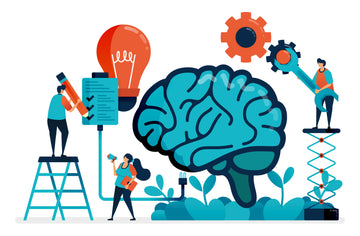By Nikhail Thakker, Dr. Christine Wong, PhD
You’ve likely encountered myths about the brain without being aware– like how you only use 10% of your brain, and that classical music can make you smarter. While perhaps convincing, these misleading myths have become widespread beliefs, overshadowing scientific truth.
Curious about the real facts? Join us as we debunk these myths and explore how our brains really work.

PHOTOGRAPH BY LUKE JONES, UNSPLASH
1. Myth: Video games rot your brain
(Fact: Gaming can improve cognitive function)
So often it’s frowned upon to play video and computer games, with the idea that it rots your brain. Although spending too much time playing games might not be the most productive use of time, there is no evidence to suggest it can directly damage your brain.
In fact, gaming in moderation has been studied to enhance memory (1), especially in younger children. It has also proved as an effective training method for improving cognitive skills such as attention, problem solving, and motor control (2).
Because prolonged, focused attention is needed when playing video games, it’s also a way to train for an increased attention span – just what we need, considering our attention spans are notoriously shrinking in this new day and age (3).

PHOTOGRAPH BY NARIT BUALUANG, VECTEEZY
2. Myth: Classical music makes you smarter
(Fact: Listening to music you enjoy improves learning)
The sounds of the orchestra are often synonymous with prestige, high culture, and intellectualism. This, supplemented by the coining of the Mozart effect in 1993 (4), which linked listening to the composer’s classical pieces to greater cognitive function, brought about the belief that exposing yourself to classical music heightens your intelligence. Let’s be honest, if getting smarter was as easy as plugging in a classical playlist while you work, we’d all have gotten straight As.
The study has since been debunked (5), showing no correlation between listening to a Mozart piece and cognitive processing. Rather, it’s been discovered that listening to music you personally enjoy may be linked to improved learning (6).

PHOTOGRAPH BY IBRANDIFY GALLERY, VECTEEZY
3. Myth: The left side is logical, the right side is creative
(Fact: Both sides are used for logic and creativity)
You’ve probably come across the terms “left-brained” and “right-brained,” with logical thinking from the left and creative thinking from the right. In reality, this theory massively oversimplifies how your brain works.
Each hemisphere of your brain is responsible for a whole variety of tasks, a great deal of which are interconnected and require communication between both hemispheres (7) through a highway of nerves called the corpus callosum.
While certain sides of the brain may have areas that play key roles in specific processes, both sides of the brain are still necessary. For example, the Werknicke’s area–known as the language area–is found on the left side of the brain but research displays that the right hemisphere is also involved in language (8).
 PHOTOGRAPH BY KSENIIA CHUNAEVA, VECTEEZY
PHOTOGRAPH BY KSENIIA CHUNAEVA, VECTEEZY
4. Myth: You can’t grow new brain cells
(Fact: Neurogenesis can occur throughout life)
You’ve probably heard that brain development stops in your late teen years, and that once you hit your 20’s, it’s basically downhill from there. It’s understandable why many may think that, as several physical and hormonal changes occur and plateau around that age. However, not being able to produce new brain cells couldn’t be farther from the truth. Behold, neuroplasticity and neurogenesis.
Neuroplasticity is the ability of your brain to learn and adapt behaviors from experience and growth, which can occur late into adult life. Although the brain may have stopped growing in size, Neurogenesis - the production of new brain cells can still occur throughout life (9), and in fact can be stimulated through exercise.

PHOTOGRAPH BY PAPAN SAENKUTRUEANG, VECTEEZY
5. We only use 10% of our brain
(Fact: We use our whole brain)
This catchphrase probably rings a bell, “if only we used 100% of our brain…”. This, to some extent, rings true, with there being habits and methods that you can use to prime your mind into doing things more efficiently. However, to say that we only use 10% of our brains is 100% false.
In fact, we use our whole brain (10)– with neuroscientists now having access to high-resolution functional imaging technology, scans have revealed activity in the vast majority of the brain. Even during times where you may think the brain is inactive, such as deep sleep or while relaxing, a great proportion of the brain is still in use.
Get Brain Gains from the Facts
So, if you’ve been avoiding video games in the fear of brain rot, know it can actually enhance your cognitive function. Or perhaps if you tried listening to classical music to boost learning to no avail, try switching to music you enjoy most. Also know that you’ve always been using 100% of your brain and that you are capable of adapting and building new brain connections, even when it may not feel like it, especially during those mental roadblocks.
If you’re looking for a way to boost your mind and overcome those roadblocks with ease, try our Flojo drinks, with a low sugar, low caffeine plant-powered productivity punch, with a formula expertly crafted by neuroscientists.
Works Cited
(1) Clinic, C. Are Video Games Good for You and Your Brain? Cleveland Clinic. https://health.clevelandclinic.org/are-video-games-good-for-you (accessed 2024-07-31).
(2) Bediou, B., Rodgers, M. A., Tipton, E., Mayer, R. E., Green, C. S., & Bavelier, D. (2023). Effects of Action Video Game Play on Cognitive Skills: A Meta-Analysis. Technology, Mind, and Behavior, 4(1: Spring 2023). https://doi.org/10.1037/TMB0000102
(3) Ducharme, J. (2023, August 10). Why everyone’s worried about their attention span—and how to improve yours. Time Magazine. https://time.com/6302294/why-you-cant-focus-anymore-and-what-to-do-about-it/ (accessed 2024-08-8).
(4) Jenkins, J. S. The Mozart Effect. Journal of the Royal Society of Medicine 2001, 94 (4), 170–172. https://doi.org/10.1177/014107680109400404.
(5) Steele, K. M. The Mystery of the Mozart Effect: Failure to Replicate - Kenneth M. Steele, Karen E. Bass, Melissa D. Crook, 1999. Psychological Science. https://journals.sagepub.com/doi/abs/10.1111/1467-9280.00169 (accessed 2024-07-31).
(6) Gold BP, Frank MJ, Bogert B, Brattico E. Pleasurable music affects reinforcement learning according to the listener. Front Psychol. 2013 Aug 21;4:541. doi: 10.3389/fpsyg.2013.00541.
(7) Nielsen, J. A.; Zielinski, B. A.; Ferguson, M. A.; Lainhart, J. E.; Anderson, J. S. An Evaluation of the Left-Brain vs. Right-Brain Hypothesis with Resting State Functional Connectivity Magnetic Resonance Imaging. PloS one 2013, 8 (8), e71275–e71275. https://doi.org/10.1371/journal.pone.0071275.
(8) Lindell, A. K. In Your Right Mind: Right Hemisphere Contributions to Language Processing and Production. Neuropsychology Review 2006, 16 (3), 131–148. https://doi.org/10.1007/s11065-006-9011-9.
(9) Moreno-Jiménez EP, Flor-García M, Terreros-Roncal J, Rábano A, Cafini F, Pallas-Bazarra N, Ávila J, Llorens-Martín M. Adult hippocampal neurogenesis is abundant in neurologically healthy subjects and drops sharply in patients with Alzheimer's disease. Nat Med. 2019 Apr;25(4):554-560. doi: 10.1038/s41591-019-0375-9.
(10) Vreeman RC, Carroll AE. Medical myths. BMJ. 2007 Dec 22;335(7633):1288-9. doi: 10.1136/bmj.39420.420370.25.




